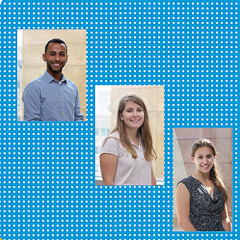Growing number of Temple engineering students are utilizing co-op and internship opportunities to burnish their resumes

This summer Abby Sydnes, a rising junior electrical engineering major, worked as an intern on an integrated radio and optical communications project at NASA's Glenn Research Center in Cleveland, Ohio.
Mario Mata, a rising senior bioengineering major, interned with DuPuy Synthes—a West Chester, Pennsylvania, medical device firm recently acquired by Johnson&Johnson for whom he also co-opped three days a week during the spring semester. Mata, a naturalized U.S. citizen from Egypt, has been designing prototypes and testing protocols for new orthopaedic trauma surgical devices.
finally, since January Lakin Daynorowicz, a rising senior civil engineering major, has addressed environmental compliance issues at two GlaxoSmithKline pharmaceutical plants in Montgomery County.
The trio are among the growing number of Temple engineering students who are utilizing paid co-op and internship opportunities to burnish their resumes, refine their career choices and forge valuable industry connections. Those who take off a spring or fall semester to work in a co-op position also earn three academic credits.
"It's a great opportunity for students to work full-time for three or four months at a firm for whom they presumably would like to work," says Mike Madera, the College of Engineering's assistant director for industrial relations and co-ops. "It often results in a job offer from that firm. At the very least, it's great experience that can lead to a job elsewhere.
"And for employers, it's a great opportunity to work with students on-site for three months in what amounts to a test run."
Forty-one percent of the college's most recent graduating class took advantage of internship and/or co-op opportunities.
"It was very cool to work at NASA with a lot of very talented people with differing backgrounds," says Sydnes, a member of the college's robotics club who is concentrating on computer engineering.
Adds the Radnor High School graduate, "It felt good not just pushing papers, knowing that the research I was involved in was a part of bigger projects that ultimately will be used in space or at ground stations."
Mata, who won the college's Engineering Week undergraduate poster competition in February, began working in the laboratory of Peter Lelkes, the founding chair of the Bioengineering Department and director of the Temple Institute for Regenerative Medicine and Engineering (TIME), as a freshman.
"I'm hoping my experience with DuPuy Synthes helps me stand out for them or another firm," says the Upper Merion High School graduate who continues to work there. "To be able to work hands-on with devices that ultimately will be implanted in humans is a lot more valuable than reading about implants or doing calculations in school. I've also learned a lot about the process involved in taking a device from an idea to out in the market, including what's involved in obtaining FDA approval."
Daynorowicz, who has also worked for two GSK subcontractors and for the college's National Science Foundation-supported Water and Environmental Technology Center, now has a much greater understanding of how governmental regulations affect corporate operations. The former Reading, Pennsylvania, resident says her co-op/internship experience has been invaluable:
"I ask other students: 'When else in your life are you going to get a chance to make just less than an engineer does while experimenting with a job for three to six months with one company? If you like it and they like you, they will take you on full time after you graduate. And if you don't, you've had a great learning experience and can move on to another company."
Story by Bruce Beans

